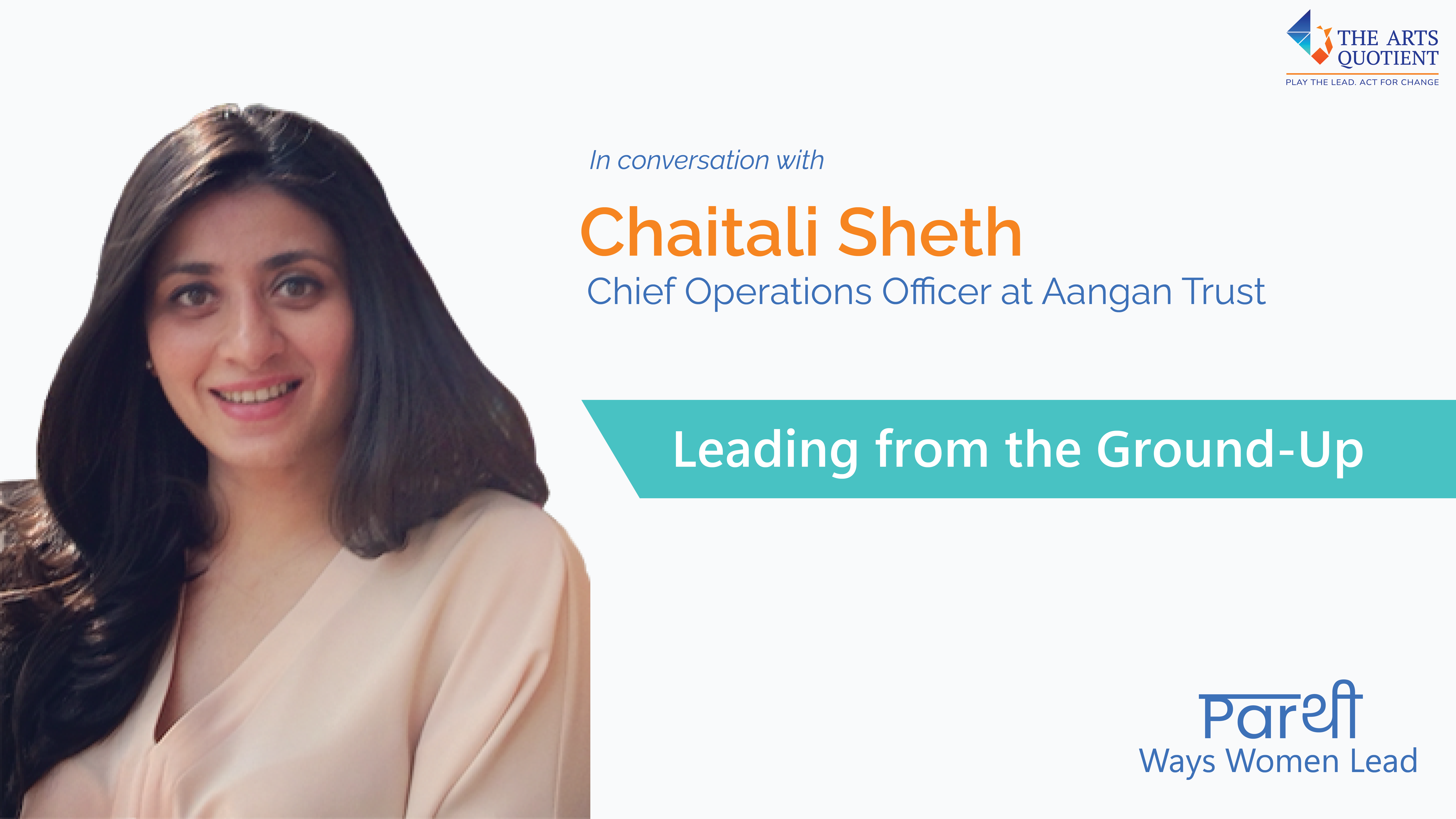The Aangan Trust works in a very tough space – with at risk children and adolescents in hotspots for child trafficking, early marriage, child labour and violence. Working with the extremely marginalized, the effort is to seed systemic support for children, young girls and boys who need help guidance and even protection – often from people within their own communities. The charter of such an organization is obviously full of challenges and leading the operations of this not-for profit is Chaitali Sheth. She oversees all operations, ensure the strategy is implemented across the different states, and leads growth informed by data.
In this candid chat, Chaitali shares her story of finding purpose in the not-for-profit space, her learning curve as a leader and the interaction between gender, careers and the drive to influence change. She shares stories of how she had to negotiate her identity in this space, challenge different kinds of social boundaries and learnt to make ground-up, collaborative models of impact come alive.
Finding purpose

Chaitali’s path has not been a traditional one. She did not formally study social work or spend years working in a large commercial organization before transitioning into leadership roles in the not-for-profit space. Instead, she willy-nilly wandered into it as a young college-goer and grew to find purpose and create a career in it. Of her early experiences she talks about how so much of it was a process of discovery.
Chaitali’s path has not been a traditional one. She did not formally study social work or spend years working in a large commercial organization before transitioning into leadership roles in the not-for-profit space. Instead, she willy-nilly wandered into it as a young college-goer and grew to find purpose and create a career in it. Of her early experiences she talks about how so much of it was a process of discovery.

“So it was actually by chance. I was 15 and had just finished the 10 standard exam where you have that long break, I think in march up until college starts. And one of my teachers in school used to teach at Akanksha, at that point Akanksha was completely voluntarily run. So just completely out of boredom I started, volunteering at a centre, not knowing anything at that point, and really quite by chance, started volunteering, and then just got completely hooked.
I look back and I think – did we even know what we were doing? Once when we went to pick up the children for their usual session from P D’mello Road, we found that their huts had been demolished and they were literally on the street with their bartans and things and no food. So we went to the Oberoi where we had a connection and said can you give us your leftover food? And we fed these kinds for 4-5 days until the rebuilding happened. Looking back, maybe we should have been more cautious. We didn’t check with anyone and just started giving the food out. Maybe it was a bit crazy, but we just did things like this.
And I continued volunteering through college, and started getting a glimpse into the lives of children and their families. For the first time I realized what privilege really is. One thing I remember is that when we would take the kids to Xavier’s college, they would run to the bathrooms first and turn on all the taps and just like drench themselves, and we were just like, what is going on? But then we realized they don’t see running water! So we let them just drench themselves and clean themselves, if that’s what it takes. To answer your question, no, I didn’t know that I wanted to make this kind of impact. But once I started working, nothing else made sense. I have been doing this since I was 15. I’ve never done any other job, never worked in any other sector.”


I was almost like living two lives, right? I was doing this in the day, but at night, I was going partying with friends as college goers do and going to all these places and spending all this money. I think I struggled with that for a while. For me, this was never social work. It was just what you do, and what you did. I was very inspired by the founder of Akanksha, Shaheen at that point. It just seemed like there was so much to do.
I was almost like living two lives, right? I was doing this in the day, but at night, I was going partying with friends as college goers do and going to all these places and spending all this money. I think I struggled with that for a while. For me, this was never social work. It was just what you do, and what you did. I was very inspired by the founder of Akanksha, Shaheen at that point. It just seemed like there was so much to do.
To answer your question, no, I didn’t know that I wanted to make this kind of impact. But once I started working, nothing else made sense. I have been doing this since I was 15. I’ve never done any other job, never worked in any other sector.”
Being a woman in the social sector
Back when Chaitali started working, it was not uncommon for women to seek careers, but clearly from her story, you can see that it created some dissonance, especially because she was entering a sector where organizations were on shoestring budgets and salaries were terribly low. How could this be a career? It probably was not…it is just social service and that is fine for girls to do because they are not expected to bring home the bacon anyway! Chaitali talks about navigating all of this to craft a career that she has been in for over two decades now.
“Okay, you’re a girl, you’re doing social work. That’s fine. It’s okay to do this work, because you don’t really have to earn. And so, you know, you’re just doing some social work. And it’s fine to do that. Because you’re a girl and somebody will take care of you – right now your father is and then somebody else will take care of you. The point is, I’m not doing this because I am a girl. I would have done this work regardless of what I am.
And so, it was always like, you can volunteer for some time, do it for two hours. But to make it a full-time career was unheard of! I think my parents started taking it seriously only when I said I need to move from Bombay. And I was going to Pune to set up Akanksha at Pune and that’s when they understood that I am serious about this.”
The point is, I’m not doing this because I am a girl. I would have done this work regardless of what I am.
The point is, I’m not doing this because I am a girl. I would have done this work regardless of what I am.
“All those years ago, you just saw a lot of women from very privileged backgrounds doing this work because they could afford to do this. And we didn’t see as many men. These women wouldn’t take salaries and stuff. And then I moved to Pune and said I’m going to have to support myself. So now I’m going to have to ask for more from the organization and if they can afford to and if they seem to think that I bring value, they’ll figure it out. If I’m being given this level of responsibility of setting up their operations in another city, clearly, I bring something to the table. And so, I’m just going to have to negotiate. So, it was a lot of negotiation. And it was saying, you know, I’ll do this for two years, I will set it up, it will be running, you will get the funding, and you will get the target whatever the targets set. But I need this in return. So, yeah, I guess they saw that.

If in a corporate job or somewhere else, if you were asked to move, or you were asked to relocate, you would be compensated. I don’t need to feel bad about it. I think in this sector, we feel very bad about asking or demanding or, you know, getting reimbursed and things like that. Plus I was also negotiating for my space with my parents that this is not just some social work that I’m doing. But this is like a job and be okay and reconciling that what I’m asking for is not unreasonable. So yeah, it was a lot of negotiating and being okay with that.”

Women role models and learning to be a leader
Chaitali had the unique experience of working for women-led organizations from the start of her career. Here is spoke about how that impacted her leadership style and what she learnt from her role models.
“I’ve only had women bosses. I’ve had very different women bosses. In my early 20s the woman leader I had was just madly inspiring. You saw what women can achieve and what women can go out and do. My mother has never worked so growing up I never saw women working. I was the first woman at home to start working so none of my aunts or, you know, nobody worked. Like professionally, you know what I mean? Just like have a career. So, to see that you can actually go out and raise money and build your own organization. I think that was great to see.
As I grew older and I had another woman boss, when I was in Edinburgh. She was very different – much older, she’d sort of done her piece. I mean, that was also a different culture, UK has a very different culture of work. But you know, you can get time off and you should take holidays, and I was seeing that she was still madly successful.


And then with Suparna (at Aangan), again, it was different. It’s about what you are building. You actually can build your tribe. It doesn’t have to be about you. You have to build, and you have to be able to give it to the next line and say, now take it on.
I’ve seen very different women leaders, and I think it worked. They’re all very inspiring, but I think in different points in my career, I think they worked and it made sense, but you know, at this point, it’s more about, it’s not, it’s not about you. It’s more about what are you doing with other women and other people within the organization? How do you take people with you?
It doesn’t have to be about you. You have to build, and you have to be able to give it to the next line and say, now take it on.
It doesn’t have to be about you. You have to build, and you have to be able to give it to the next line and say, now take it on.
Collaborative models – ground-up
Aangan manages change and impact from the ground-up. The space that they work in necessarily demands that they collaborate extensively with stakeholders on the ground to realize their vision. Their collaborative models also extend to how they manage their own team, relate to each other and facilitate projects that support their agenda. A great example of this collaborative ground-up process is their Alone Together report that they drew up based on research into the experience of teens and children during the lockdown. The research model itself got crafted together with the most affected stakeholder – the children and teens themselves. Chaitali discusses this project in this excerpt below. She also speaks from the heart about her own learning curve in making this kind of collaborative working possible.
“At Aangan my first couple of years, I held everything very close, obviously Suparna (my boss) had sort of said, you go with it, but I wasn’t doing that. I’ll be very honest. Because, it’s my responsibility, I’ve been given the accountability and I’m gonna hold this have that control. But I think it doesn’t work.
I don’t think organizations grow with control. I think organizations only grow and thrive when you give away the control, when you’re investing people into your work or you’re investing people into the vision that you have. Because if you just want people to do your work, you’re not going to build leaders and organizations with them. I think that’s something that I learnt.
I don’t think organizations grow with control. I think organizations only grow and thrive when you give away the control, when you’re investing people into your work or you’re investing people into the vision that you have. Because if you just want people to do your work, you’re not going to build leaders and organizations with them. I think that’s something that I learnt.
Organizations are about people. Yes, of course, the founder is most important. But it’s a give and take – someone passes it on to someone else, and you and you build that, because then the investment in that work grows. But that’s really, really hard. Because at the end of the day, the final accountability lies with me. So, while you’re allowing people to make mistakes and yet take accountability, that’s a very hard thing.


I think just having more people around you that you can trust and also knowing that someone has your back and having a strong set of peers. And I think that’s what’s missing, I feel like in a lot of other organizations there aren’t peers at work, it’s like, okay, this is my boss, and this is someone that reports into me, but I might report into Atiya, or I might report into Suparna but they’re still peers, I can still talk to them.”
“The Alone Together report came out of a conversation that I was having with a colleague of mine about how girls were just not having the opportunity to talk to anyone during the lockdown, hadn’t seen anyone, and were only sort of steeped in work at home. Especially in places like Patna and Banaras and Bombay. It’s a very urban issue. In rural parts and villages, there was still mobility, there was movement. So I talked about this to Suparna and she said we should bring together young girls to just interview and talk to other girls. And so that sort of idea came from her. And then we brought two other young girls on our team to say, okay, how do we manage this so together we came up with the questionnaire so it was very much a collaborative effort. And then the two girls on our team that went out and spoke to other young girls from Bombay and other places, and then they all came together and shared we found that what everyone is going through is quite similar.
It was not any one researcher’s project. It wasn’t about doing the most perfect sampling or research methodology. It was about listening to what people around you are saying. Me as an older girl talking to a younger person was just not going to make sense. We had this peer process going and got young girls to talk to other young girls. I mean, why can’t young girls do research? The idea was to capture what is happening in urban spaces and what can be done as a result. Though what came out of it was very serious, I think they had a lot of fun just hearing each other.”
“One thing that people don’t understand with collaboration is the difference between collaboration and building consensus. Everything cannot be done in a participatory way. Sometimes, you’ve got to say, Hey, listen, I am the boss, and it’s my way, or the highway, but we still need to collaborate on it and I’m not going to build a consensus, but I’m gonna still try and invest you in what I’m saying. I know what I’ve said it’s just completely contradictory. But I think it’s about taking people along.
It is interesting, for example, in the work we do. A lot of people do social work also because you get that gratification. I went and ran a session, I did a meeting with the community and as a social worker, I got that gratification. Now we’re saying the power has completely moved to the community. They’re doing the work, you’re just supporting. And I think that has, been a bit of an adjustment for social workers. You know, if I’m removed, then what is my impact? Within our sector, we all love to do the session, we like to go do that rescue or that negotiation or whatever. But it is not about us. It’s about others doing it. And acknowledging that the power will shift.
Everything cannot be done in a participatory way. Sometimes, you’ve got to say, Hey, listen, I am the boss, and it’s my way, or the highway, but we still need to collaborate on it.
Everything cannot be done in a participatory way. Sometimes, you’ve got to say, Hey, listen, I am the boss, and it’s my way, or the highway, but we still need to collaborate on it.
When I think of Suparna and her leadership, it’s not about a person or an organisation. It’s saying that it’s everyone’s problem, so the solution needs to be everyone’s. And I think when you work with the government, and which we do a lot, and it’s just so hard. But it’s saying it’s your problem and it can be your solution, just as much. It’s not, that we’re doing the saving as an organisation, I don’t think we can. We will never be able to do it because, also because we don’t know the problems, the problems are being lived by them. The issues are theirs. But it was hard for our social workers to take a step back and not be the ones running the sessions, not being the ones solving that child marriage case or you know addressing a child at work.
When I think about the women we work with in the community also, we are not looking for leaders. We don’t want that dynamic. Even when we started working with women, I think we were very clear that we don’t want your typical leaders, we don’t want those women to be doing this, because then it also gives an idea to the other people in the community, oh, it’s like, that woman is doing this work.
The point is that anyone can do this work when you have certain tools and resources. Its making role models of just regular people. This way, everyone has the ability, and everyone has the power because everyone’s trying to make the change.”
Advice to women aspiring to leadership roles
Dont be so hard on yourself. As women we, we don’t give ourselves a break. And we just want to prove, prove, prove that we are successful at work and successful at home and killing it as daughters and mothers and wives, girlfriends, partners, and badass bosses. Just give yourself a break and say that it’s okay, and don’t take yourself so seriously. You are not the saviour and you are not going to solve every child’s problems.
Don’t feel guilty about living the life you live and then doing this work. It’s fine to go on holidays abroad, it’s fine to go buy that bag and wear nice clothes. There is a lot to be done. But you need to do it when you are happy, healthy and content.
Don’t sell yourself short – whether its compensation or time off or whatever.
Access to market linkages given the growth in ‘Meesho’ or on Flipkart and Amazon, a lot of opportunities now for women to become entrepreneurs and sell.
Pick your battles. You’re not going to win everything. It’s just not going to happen. Decide what are your complete non-negotiables, and then work backwards.
We work on empowerment, and agency of young girls and young women and when we look at the negotiation, that all the women that we around us, sometimes we don’t realize that we are compromising so much as well. And that we are continuously negotiating. It is important to have women around you and have their stories close to you. I think it does help.
